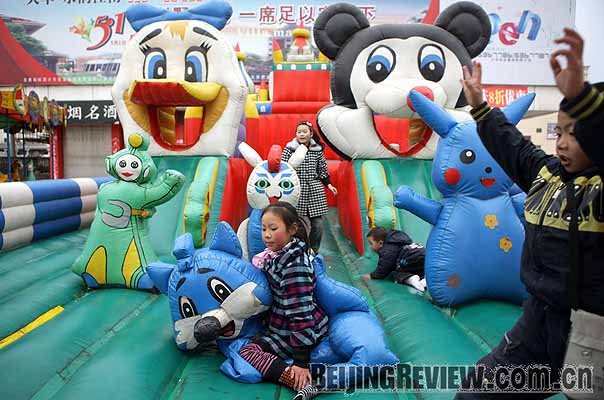| Numbers of the Week
49%
The number of Chinese toy export companies fell by 49 percent to 4,388 last year compared with 2007.
128.5%
The country's online shopping trade volume reached 120 billion yuan ($17.7 billion) in 2008, an increase of 128.5 percent year on year.

TO THE POINT: The government promulgated a series of industrial revitalization plans to keep the economy from slipping. The State Council approved a plan to revive the nation's shipbuilding industry. The January consumer price and producer price indexes indicated inflationary pressure had disappeared, but suggested possible deflation. Imports and exports bore the brunt of the global economic downturn in January, with the total trade value slipping by almost 30 percent year on year. For the first time, China overtook the United States as the largest car market in the world.
By LIU YUNYUN
SOS--Save Our Ships
The government approved a plan to support the domestic shipbuilding industry on February 11, as part of its endeavors to counter the global economic slowdown.
It was the fifth industry revitalization plan so far after similar plans for the auto and steel industries were unveiled on January 14 and one for the textile and equipment-manufacturing industries on February 4.
The State Council, China's cabinet, will encourage financial institutions to expand credit to purchasers of exported ships and extend fiscal and financial support to domestic buyers of long-range ships until 2012.
The government will limit the construction of new capacity in the industry and is reviewing a policy that would force the replacement of outdated ships, encourage the production of more advanced ships and promote mergers and acquisitions in the industry.
In early February, the China Association of National Shipbuilding Industry estimated that new ship orders this year would drop by about 50 percent from that of last year to 20 million-30 million deadweight tons.
The government soon will issue detailed measures to keep shipbuilders' order books steady in an effort to guard against operational risks and maintain stability in the industry.
Plans for reviving the light industry, petrochemical, non-ferrous metal, electronics and information industries are expected to be issued before the opening of the National People's Congress in March.
Major Economic Figures in January
CPI--up 1.0 percent
The inflation control policies and the ongoing global financial turmoil have in effect helped trim inflation in China. The consumer price index (CPI), the main gauge of inflation, grew a mere 1 percent in January year on year for the lowest growth rate in 31 months. It took the country no more than one year to rein in the runaway inflation.
The consumer price growth rate had dropped for nine months in a row since last April. Many financial research institutes estimated that February's CPI growth would fall into negative territory.
Pork prices, the major trigger of last year's inflation, were down 13.3 percent year on year. Prices of energy and raw materials have fallen since mid-2008 and recently stabilized.
Yao Jingyuan, chief economist of the National Bureau of Statistics (NBS), said the government's major task had shifted from controlling inflation to preventing the economy from slowing down. He also said there might be potential deflationary problems where supply was greater than demand, which in turn would lead to sharp price drops. He stressed the government would address these potential problems by expanding domestic consumption.
Some analysts said inflation might pick up again if the severe drought in the country's major farming areas was not addressed in time.
PPI--down 3.3 percent
The producer price index (PPI) for manufactured goods dipped by 3.3 percent year on year in January, indicating the demise of inflationary pressure, although the prospect of deflation still looms.
Of all the goods monitored by the NBS, the price of crude oil plunged the most by nearly 50 percent year on year. In general, NBS figures indicated that prices of raw materials, fuel, and power fell 5.3 percent.
An NBS statement issued after the release of the PPI figure said the U.S.-led financial crisis had caused substantial decreases in crude oil, ore and food prices in the international market, which led to domestic price drops.
The PPI for the mining and coal industries was up 22.7 percent over January last year. Of this amount, the PPI for crude coal was up 12.3 percent.
| 